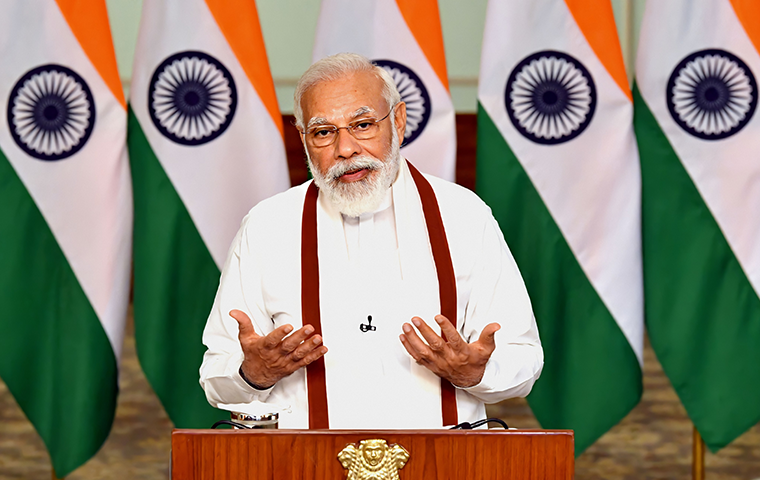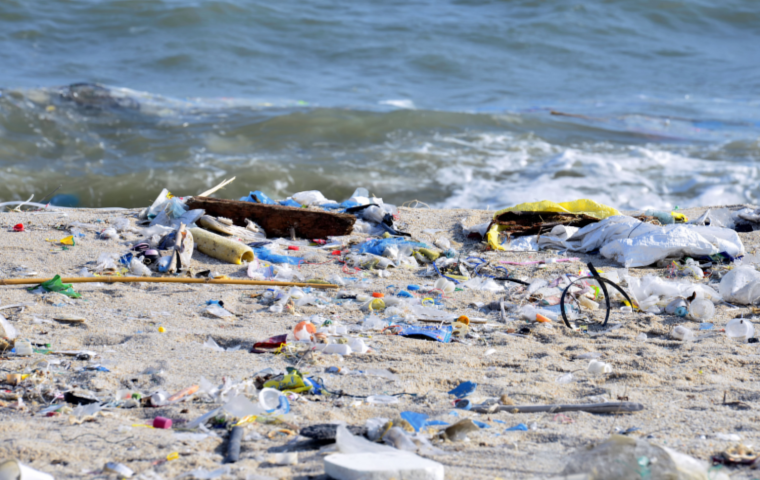Towards the Indo-Pacific Century (#2)
Related Articles

Commemorating “a Century Ago”
Continued from #1
The world war ended, and a new era began—that must have been the honest feeling in Japan and the world a century ago.
The British diplomatic historian Thomas G. Otte claims the custom of centenary celebration began in nineteenth century Europe, saying, “Centenary celebrations helped to revive, perpetuate and reinforce public perceptions of historical events and people in collective memory.”*7 When we use such a perspective here, various interesting images emerge.*8
First, in 1920, with the establishment of the League of Nations, there was the budding of liberal international order. Later, the U.K. and the U.S. worked mainly to organize this internationally, which was codified and clarified by the Atlantic Charter drafted in August 1941 between British Prime Minister Winston Churchill and U.S. President Franklin D. Roosevelt. The Charter stated the vital liberal norms such as free trade, people’s right to self-determination, freedom of navigation, and establishment of an international organization.
However, in this modern era, China in recent years is openly challenging these liberal norms by rejecting Hong Kong’s autonomy, cracking down on Uyghurs in Xinjiang, obstructing freedom of navigation in the South China Sea, and criticizing democracy. Claremont McKenna College Professor Minxin Pei explains, “For China’s one-party dictatorship, liberalism order is nothing less than an existential political threat. As a nation, China has gained significant economic and security benefits from the liberalism order. But in several vital aspects, the Chinese Communist Party’s dictatorship is incompatible with this order.”*9 If so, China will continue to challenge the liberal international order in the future.
Also, as President Trump announced the U.S. withdrawal from the World Health Organization (WHO) and continues ceaseless criticism of the UN, World Trade Organization (WTO), and other international bodies, Princeton University Professor John Ikenberry argues: “When future historians think of the moment that marked the end of the liberal world order, they may point to the spring of 2020.”*10 Seeing the Western liberal democratic states failing to show global cooperation or present a common objective in the face of the COVID crisis, Ikenberry does not hide his disappointment. The liberal international order has been undermined from within and irreversibly damaged by President Trump’s “America First” foreign policy. Thus, the “century” for forming the liberal international order that began with the establishment of the League of Nations in January 1920, is on the downturn, from the U.S.-China confrontation in 2020 and the self-serving actions by the heads of the two states that harm the international order.
Second, when we look back at the last century, we realize it began with the receding of the Spanish flu and returned to the COVID pandemic. Humans have accumulated scientific knowledge to overcome infectious diseases, and considered the prescriptions required.*11 In 1980, the WHO declared victory in achieving a world free of smallpox. But that was overconfidence. More than we imagine, a vast unknown world spreads across nature, while human knowledge is limited. We could say this immense hardship is the consequence of humans losing humbleness towards nature’s powers. Of course, humans are working to overcome this difficulty by developing vaccines and ensuring public health, and those are highly valuable and noble efforts. Yet, regardless of scientific advancements, we must not lose humility towards nature—that is what the last 100 years tell us.
Third, we notice that the global center is shifting from the Atlantic to the Pacific. Now, the world’s top three economies are all in the Pacific Rim. And it is the U.S.-China relations that are currently moving international politics. So, the Pacific region, which is the economic center, will continue to prosper for a while.
From the Pacific Century to the Indo-Pacific Century
Nine years ago in 2012, this magazine (Asteion) published a special issue with the theme “What Is the Problem Now?” which is similar to this issue’s feature, and I contributed a piece titled “Towards the Pacific Century.”*12 In the article, I raised questions on two points.
First, by reviewing the past century from the perspective of global history, I described how the center stage of international politics was shifting from the Atlantic to the Pacific. Understandably, this differs vastly from the era of the two world wars, when the West was at the center of the world wars, and the U.S. and the U.K. drafted and issued the Atlantic Charter in August 1941 during a world war. Also, as I mentioned earlier, this is vividly displayed in the fact that some of the vital ideals of global cooperation that have been protected by the liberal international order have been damaged in the U.K. and the U.S., by Brexit and President Trump.
Second, in my piece written a decade ago, I questioned that the twenty-first century is at a crossroads of whether it can be a “pacific” century, by applying the pronunciation “pacific” for Taiheiyo, the Chinese characters for “Pacific Ocean.” And I argued it was the Japan-U.S.-China relations that would affect this. Even after Biden became the president, the U.S.-China confrontation continued to intensify. Meanwhile, with even talks about military clashes between Japan and China or the U.S. and China over Taiwan’s Pratas Islands and Japan’s Senkaku Islands, realpolitik is moving opposite from the cooperative framework I had hoped for 10 years ago. In other words, we are facing the reality of declining liberal international order.

The Pacific Century, or the “pacific (peaceful) century,” with Japan-U.S.-China cooperation at the core, never came. What we are seeing now is the Indo-Pacific Century. Namely, a new trend with Japan, the U.S., Australia, and India—the four large democratic nations in the region—uniting to form and protect the liberal order called a Free and Open Indo-Pacific. Moreover, this is based on the Japanese diplomatic initiative that began in August 2016 from Prime Minister Abe’s speech in Nairobi, Kenya. This is also the materialization of the world I envisioned a decade ago. Here’s what I wrote:
“During the Atlantic Century, Japan had been positioned as the Far East for a long time and was content being a bystander in many important issues of international politics. However, this will not do in the future world. By effectively using its limited resources through superior political power, Japan must engage more actively in foreign affairs to ensure its interests and security.”*13
It states that, as a result, together with like-minded nations, Japan will lead the Indo-Pacific Century, and take diplomatic initiative. In the Indo-Pacific Century, Japan will not be playing the same role as the U.K. in the nineteenth century “Pax Britannica” or the U.S. in the twentieth century “Pax Americana.” However, Japan may contribute significantly to peace, stability, and prosperity in our age. This may be possible, if Japan looks back on its own path within world history, learns the lessons from there, and contemplates, to properly view the immense upheaval in international politics, and accurately grasp the great current. We could say, the Indo-Pacific Century is an era in which Japan is given a chance to play a role on the center stage of international politics.
This is a translation of the Japanese article published in vol. 94 (May 2021) of the Asteion magazine.
[Notes]
*7 T.G. Otte, “Centenaries, self-historicization and the mobilization of the masses,” edited by T.G. Otte, The Age of Anniversaries: The Cult of Commemoration, 1895-1925. London: Routledge, 2018, Kindle edition.
*8 Asteion vol. 91 (2019) also featured “The Future as a Possibility,” by referring to “Japan 100 Years from Now,” an extra edition of Nihon oyobi nihonjin (Japan and the Japanese) magazine by the journalist Setsurei Miyake published 100 years ago in 1920 and presenting an outlook for “Japan 100 years from now.” This could precisely be an influence of “the cult of centenary” stated by Otte. In the preface titled “The Past as a Possibility: 100 Years of Discussions on the Treaty of Versailles,” Nagoya University Associate Professor Akira Okubo summarizes the historic discussions on the Treaty of Versailles and the post-war order the treaty created.
*9 Minxin Pei, “Chugoku ha kyodaika surunoka (Will China Get Stronger?),” Asteion vol. 88, 2018, 67.
*10 G. John Ikenberry, “The Next Liberal Order: The Age of Contagion Demands More Internationalism, Not Less,” Foreign Affairs, July/August 2020, 133.
*11 Two excellent works in Japanese on this topic are, Kayo Takuma, ”Kokusaikyoryoku toiu kanosei: gurobaru gabanansu to chiseigaku” (The Possibilities of International Cooperation: Global Governance and Geopolitics), edited by Shinichi Kita & Yuichi Hosoya, Atarashii chiseigaku (New Geopolitics), Toyo Keizai, 2020, and Kayo Takuma, Jinrui to yamai: kokusaiseiji kara miru kansensho to kenko kakusa (Humans and Diseases: Infectious Diseases and Health Disparity from the Point of Global Politics), Chuko Shinsho, 2020.
*12 Yuichi Hosoya, “Taiheiyo no seiki ni (Towards the Pacific Century),” Asteion vol. 76, 2012, 51-62. Discussed in more detail in Chapter 4 of Yuichi Hosoya, Kokusai chitsujyo 18 seiki yoroppa kara 21 seiki ajia he (International Order: From Eighteenth Century Europe to Twenty-first Century Asia), Chuko Shinso, 2012.
*13 Yuichi Hosoya, “Taiheiyo no seiki ni,” 61.
Yuichi Hosoya earned a Ph.D. in international politics from Keio University. He is the Research Director at the Asia-Pacific Initiative (API). His specialties are international politics and diplomatic history. After serving as a lecturer at Hokkaido University and Keiai University, he is currently a professor of international politics at Keio University. He is the author of many books, including Sengo kokusai chitsujyo to igirisu gaiko (“Post-war International Order and British Diplomacy,” in Japanese, from Sobunsha, winner of Suntory Prize for Social Sciences and Humanities), Rinriteki na senso (“Ethical War,” in Japanese, from Keio University Press), Sengoshi no kaiho (I & II) (“Liberation of Post-war History,” in Japanese, from Shinchosha), Atarashii chiseigaku (author and editor, “New Geopolitics,” in Japanese, from Toyo Keizai).




